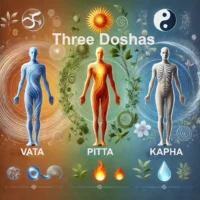What is Ayurveda? A Beginner’s Guide to Holistic Healing
Imagine waking up every morning feeling light, energized, and ready to embrace the day. But lately, you’ve been stuck—tired, stressed, or just off. You’ve tried everything, but nothing sticks. What if the answer isn’t in a pill or a trend, but in a timeless system that’s healed millions? That’s Ayurveda. It’s not just medicine; it’s a way of life. Let’s uncover how this ancient science can help you reclaim balance, health, and joy.
What is Ayurveda? The Science of Life
Ayurveda (pronounced ah-yur-vay-duh) is a Sanskrit word meaning “knowledge of life.” Born in India over 5,000 years ago, it’s the world’s oldest holistic healing system. Unlike modern medicine, which often treats symptoms, Ayurveda digs deeper. It asks: Why are you unwell? What in your lifestyle, diet, or emotions is out of sync?
The Five Elements: Building Blocks of Existence
Ayurveda teaches that everything—including you—is made of five elements:
- Earth (solidity, structure)
- Water (fluidity, nourishment)
- Fire (transformation, digestion)
- Air (movement, breath)
- Space (expansion, openness)
These elements combine to form three life forces called doshas, which govern your body and mind.
The Three Doshas: Your Unique Energy Code

Your dosha is like a fingerprint: no two people have the exact same mix. Knowing your dominant dosha helps you eat, move, and live in harmony with your nature.
1. Vata (Air + Space)
- Traits: Creative, quick-thinking, loves change.
- When Balanced: Energetic, joyful, adaptable.
- When Imbalanced: Anxious, forgetful, bloated, or dry skin.
- To Balance: Warm foods (soups, stews), routines, grounding yoga (like Balasana), and self-massage with sesame oil.
2. Pitta (Fire + Water)
- Traits: Ambitious, focused, loves challenges.
- When Balanced: Strong digestion, sharp mind, passionate.
- When Imbalanced: Anger, acid reflux, skin rashes, burnout.
- To Balance: Cooling foods (coconut, cucumbers), moonlit walks, swimming, and meditation.
3. Kapha (Earth + Water)
- Traits: Calm, loyal, loves comfort.
- When Balanced: Strong immunity, steady energy, compassionate.
- When Imbalanced: Weight gain, congestion, laziness.
- To Balance: Spicy foods (ginger, chili), vigorous exercise, and waking up before 6 AM.
Ayurvedic Daily Routines: Secrets to Lifelong Health
Dinacharya: Your Daily Blueprint
- Ayurveda’s magic lies in small, consistent habits. Try this daily routine:
- Wake Up Early (5–6 AM): Align with the calm, fresh energy of dawn.
- Scrape Your Tongue: Remove toxins (ama) with a copper tongue scraper.
- Drink Warm Lemon Water: Flush out impurities and kickstart digestion.
- Abhyanga (Self-Massage): Massage warm oil (sesame for Vata, coconut for Pitta, mustard for Kapha) into your skin.
- Yoga & Meditation: 15 minutes of sun salutations or breathwork (Nadi Shodhana).
- Eat Your Largest Meal at Lunch: When digestive fire (Agni) is strongest.
Ritucharya: Seasonal Adjustments
- Spring (Kapha Season): Detox with bitter greens, light meals, and dry brushing.
- Summer (Pitta Season): Stay cool with mint, watermelon, and moonlight meditation.
- Fall/Winter (Vata Season): Warm up with soups, ginger tea, and early bedtimes.
Ayurvedic Diet: Food as Medicine
Your plate is your first pharmacy. Here’s how to eat for your dosha:
Vata-Pacifying Diet
- Favor: Warm, moist, grounding foods (oatmeal, ghee, sweet potatoes).
- Avoid: Cold salads, raw veggies, caffeine.
- Spices: Cumin, cardamom, cinnamon.
Pitta-Pacifying Diet
- Favor: Cooling, hydrating foods (coconut, cilantro, basmati rice).
- Avoid: Spicy dishes, sour foods (yogurt, vinegar), alcohol.
- Spices: Coriander, fennel, mint.
Kapha-Pacifying Diet
- Favor: Light, spicy foods (lentils, steamed greens, honey).
- Avoid: Dairy, fried foods, sugary treats.
- Spices: Black pepper, turmeric, cloves.
Powerful Ayurvedic Herbs & Remedies
| Herb | Benefits | How to Use |
|---|---|---|
| Turmeric | Reduces inflammation, boosts immunity | Add to golden milk or smoothies |
| Ashwagandha | Lowers stress, improves sleep | Mix in warm almond milk at night |
| Triphala | Cleanses gut, aids digestion | Take 1 tsp with warm water |
| Neem | Purifies blood, clears skin | Apply oil topically or drink tea |
Ayurveda says your mind (Manas) and body (Sharira) are inseparable. Imbalanced doshas affect emotions:
- Vata Imbalance: Fear, overthinking.
- Pitta Imbalance: Anger, perfectionism.
- Kapha Imbalance: Attachment, sadness.
Mindfulness Practices
- Journaling: Write down thoughts to calm Vata.
- Gratitude Lists: Soften Pitta’s intensity.
- Nature Walks: Lift Kapha’s heaviness.
Key Takeaways
- Ayurveda balances body, mind, and spirit using the five elements and three doshas.
- Daily routines (Dinacharya), seasonal adjustments (Ritucharya), and diet are foundational.
- Herbs, yoga, and mindfulness address root causes—not just symptoms.
Conclusion
Ayurveda isn’t a quick fix. It’s a journey back to you—your natural rhythm, your inner wisdom. You don’t need to overhaul your life overnight. Start with one ritual: sip warm water at sunrise, massage your feet before bed, or swap chips for spiced roasted nuts. Slowly, you’ll feel the fog lift. Energy returns. Joy feels closer. This is Ayurveda’s promise: a life in harmony with nature, and with yourself.
FAQs
It can manage conditions (like arthritis or IBS) by reducing triggers. Always consult a doctor.
No. It’s a science open to all cultures and beliefs.
Look for certifications from institutions like NAMA (National Ayurvedic Medical Association).
Not all. Buy from trusted brands (Banyan Botanicals, Organic India) and consult a practitioner.
Top 10 Ayurvedic Herbs and Their Health Benefits


